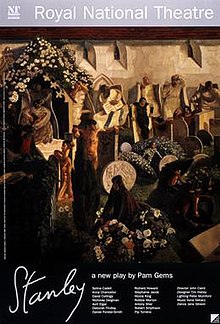Stanley (play)
| Stanley | |
|---|---|
 Original window card | |
| Written by | Pam Gems |
| Date premiered | 1996 |
| Place premiered | Cottesloe, National Theatre, London |
| Original language | English |
| Subject | A painter wants two wives on the go at once. |
| Genre | Drama |
| Setting | 1920-1959; Cookham in Berkshire and Hampstead in London, |
Stanley is a 1996 play written by English playwright, Pam Gems. The play was premiered at the Royal National Theatre's Cottesloe Theatre in London.
Plot synopsis
The play explores the complicated life of British painter Stanley Spencer, who was played by Antony Sher in the play's London and Broadway debuts.
Spencer was a twentieth century painter, whose work attempted to combine the sexual with the divine in contemporary English settings. His paintings frequently showed biblical scenes taking place in ordinary English villages, particularly Cookham, and often depicted, or used figures inspired by, his friends, relatives and lovers.
Spencer married two different women, each of whom was a gifted painter in her own right. He left his first wife, Hilda Carline, who put her ambition aside to make a home for him, to marry Patricia Preece, a defiantly unconventional lesbian who was incapable of loving him. Much of the play revolves around his passionate attachment to both women.
Awards and nominations
- Awards
- 1996 Evening Standard Award for Best Play[1]
- 1997 Laurence Olivier Award for Best New Play
- Nominations
- 1997 Tony Award for Best Play
References
- ^ Evening Standard Awards Retrieved on 8 October 2009
- Gems, Pam (1996). Stanley (First ed.). London: Nick Hern Books. ISBN 1-85459-254-8.
